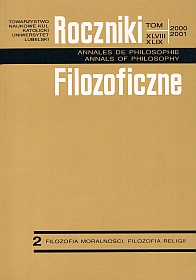U źródeł nauki − THEORÍA
Abstrakt
In the article, the author presents certain aspects concerning the constitution of science as a distinct domain of culture. Although civilizations antedating Greek civilization had many important achievements that today we would call scientific, science itself as having a definite object, method and aim appeared first in Greece. In Babylon and Egypt science had purely practical aims, such as counting and astrology. Among the Greeks, science possessed a theoretical dimension. The Greek concept of THEORIA signified science as well as the highest type of life man could achieve, the BIOS THEORETIKOS. Human knowledge progresses through stages. It passes through a phase where it has much in common with the knowledge possessed by brute animals, based on sensation and memory. At a later and higher phase, human knowledge is characterized by a more comprehensive experience than mere memory of facts, then by art, and finally by science, the crowning point of which is wisdom (philosophy).
Bibliografia
Arystoteles, Metafizyka, tłum. T. Żeleźnik, oprac. M. A. Krąpiec, A.Maryniarczyk, Lublin: RW KUL 19961.
Aubenque P.: Le problème de l'être chez Aristote, Paris: PUF 1977.
Burnet J.: Early Greek Philosophy, New York: The Meridian Books Library 1930.
Chroust A. Ch.: The Origin of Metaphysics, „The Review of Metaphysics”, 14(1960), s. 601-617.
Cyceron, O państwie, tłum. W. Kornatowski, Warszawa: PWN 1960.
Jaeger W.: Paideia, tłum. M. Plezia, t. I, Warszawa: IW PAX 1962.
Jaeger W.: The Theology of the Early Greek Philosphers. The Gifford Lectures 1936, London−Oxford−New York: Oxford University Press 1968.
Jaroszyński P.: Spór o przedmiot „Metafizyki” Arystotelesa, „Roczniki Filozoficzne”, 31(1983), z. 1, s. 93-107.
McMullin E.: The Goals of Natural Science, „Proceedings and Adresses of The American Philosophical Association”, 58(1984), nr 1 (cały zeszyt).
Merlan Ph.: On the Terms „Metaphysics” and „Being-qua-Being”, „Monist”, 52(1968), s. 174-194.
Werner Ch.: La philosophie grecque, Paris 1972.
Copyright (c) 2001 Roczniki Filozoficzne

Utwór dostępny jest na licencji Creative Commons Uznanie autorstwa – Użycie niekomercyjne – Bez utworów zależnych 4.0 Międzynarodowe.





